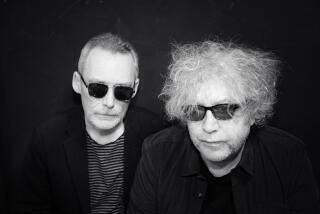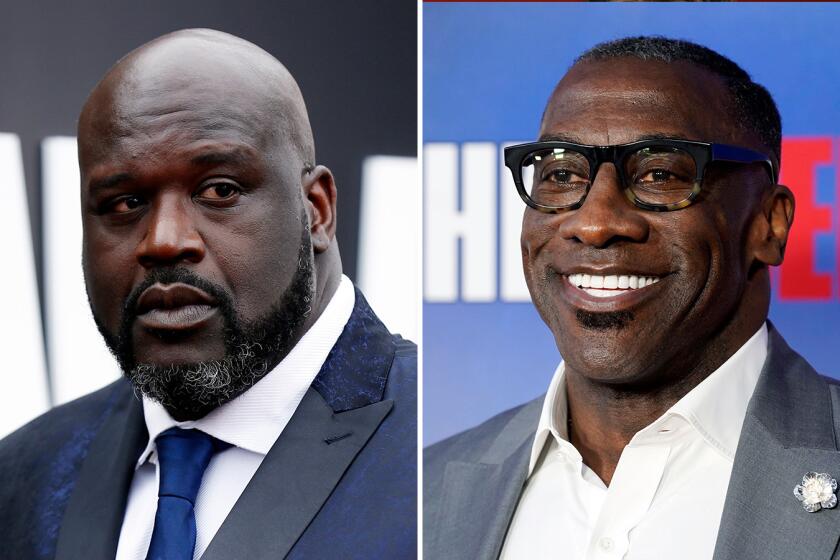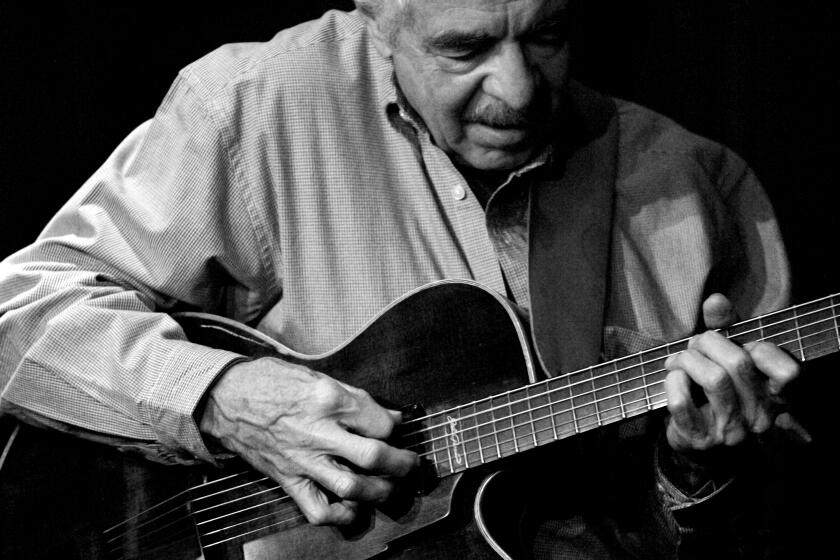Rap-Rockers Deliver Songs of Protest
Zack de la Rocha and the rest of Rage Against the Machine moved across a stage outside Staples Center on Monday with the confidence and authority of a band that was born for the drama of this moment on the streets of Los Angeles.
On the evening when President Clinton addressed the Democratic National Convention inside the downtown arena, the group unleashed the mix of radical politics and blistering sonic assault that has made it one of the most commanding bands of its generation.
“Brothers and sisters, our democracy has been hijacked,” De la Rocha shouted at the start of the group’s 40-minute attack on cultural and social repression.
The Los Angeles quartet is known for some of the most intense rock performances ever--and its free concert Monday lived up to that standard. The fans near the front of the stage moved with such crushing force that they almost broke through barricades, but there was no hint of violence during the show.
Some will argue that the post-show disturbances--which started about an hour after the band left the stage--would not have occurred had the concert not attracted a crowd larger than expected for protests on the first day of the convention. But the disturbances seemed no more connected to the band’s music than the violence after the Lakers’ championship victory recently at Staples Center was caused by basketball. Some of De la Rocha’s lyrics may speak of police brutality, but he did nothing to incite the crowd.
Instead, he and the band delivered rock ‘n’ roll at its challenging and self-affirming best.
De la Rocha, who combines the steely resolve and charismatic presence of the late Bob Marley, frequently pointed to Staples Center, underscoring the challenge in such songs as “Testify” and “Guerrilla Radio,” which speak about media indifference and using rock as a vehicle for change.
Though many outside the rock world had never heard of Rage before it stepped into the national spotlight Monday, it is one of the most acclaimed and influential bands ever to emerge from Southern California. It’s an uncompromisingly political band at a time when the idea of social consciousness in rock is largely viewed as a relic of the ‘60s. But Rage’s radical message might have been cheered by the same fans who embraced Bob Dylan in the ‘60s, and its distortion-heavy sound would have fit in nicely with Jimi Hendrix or the Who at Woodstock.
What’s remarkable about the group--which also includes guitarist Tom Morello, bassist Tim Commerford and drummer Brad Wilk--is that it has sold more than 10 million albums worldwide during a decade when pop music has become increasingly dominated by cartoonish rock anger and teen-pop novelties.
Under different circumstances, Morello might even have been a delegate to the convention on Monday rather than a voice of protest outside.
A Harvard graduate, Morello worked for two years in the late ‘80s in Los Angeles as a scheduling secretary for then-U.S. Sen. Alan Cranston (D-Calif.). But Morello was so disillusioned by the amount of time lawmakers needed to devote to fund-raising that he left politics and turned to his other passion--rock ‘n’ roll.
The idea that fueled Rage was to mix socialist politics with music that combined the most aggressive elements of hip-hop and punk. The result was a style so revolutionary--and so far from the commercial sounds of the early ‘90s--that few in the music industry thought it had a chance at success.
The band has no problem being in business with a multinational conglomerate (it records for Sony’s Epic Records), maintaining that the mass distribution and promotion muscle of the label is a necessary means of reaching a wide audience.
Backstage after the concert, before the disturbances erupted, Morello seemed a man vindicated. He may not have been a delegate, but he was representing the disenfranchised--a role that had originally drawn him to politics.
Not everyone is going to agree with Rage’s message, but its art and conviction are a liberating example of the power of rock ‘n’ roll to energize and challenge--a power that has been dormant for too long.
*
Go online to hear the music of Rage Against the Machine and read excerpts from the band’s politically charged lyrics on The Times’ Web site: https://www.latimes.com/rage
More to Read
The biggest entertainment stories
Get our big stories about Hollywood, film, television, music, arts, culture and more right in your inbox as soon as they publish.
You may occasionally receive promotional content from the Los Angeles Times.






